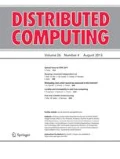Abstract.
We consider Lehmann-Rabin’s randomized solution to the well-known problem of the dining philosophers. Up to now, such an analysis has always required a “fairness” assumption on the scheduling mechanism: if a philosopher is continuously hungry then he must eventually be scheduled. In contrast, we modify here the algorithm in order to get rid of the fairness assumption, and we claim that the spirit of the original algorithm is preserved. We prove that, for any (possibly unfair) scheduling, the modified algorithm converges: every computation reaches with probability 1 a configuration where some philosopher eats. Furthermore, we are now able to evaluate the expected time of convergence in terms of the number of transitions. We show that, for some “malicious” scheduling, this expected time is at least exponential in the number N of philosophers.
Similar content being viewed by others
References
Beauquier J., Durand-Lose J., Gradinariu M., Johnen C.: Token based self-stabilizing uniform algorithms. Journal of Parallel and Distributed Computing 62(5):899-921 (2002)
Beauquier J., Gradinariu M., Johnen C.: Memory space requirements for self-stabilizing leader election protocols. In: Proc. 18th Annual ACM Symposium on Principles of Distributed Computing (PODC’99), pp 199-208. ACM Press (1999)
Beauquier J., Gradinariu M., Johnen C.: Randomized self-stabilizing and space optimal leader election under arbitrary scheduler on rings. Technical Report 1225, L.R.I., Orsay, France (1999)
Bonald T., Massoulié L.: Impact of fairness on internet performance. In: Proc. of Joint Int. Conf. on Measurements and Modeling of Computer Systems (SIGMETRICS/Performance 2001), pp 82-91. ACM (2001)
Dijkstra E.W.: Hierarchical ordering of sequential processes. In: Operating Systems Techniques, pp 72-93. Academic Press (1972)
Duflot M., Fribourg L., Picaronny C.: Randomized finite-state distributed algorithms as Markov chains. In: Proc. 15th Int. Conf. on Distributed Computing (DISC’01), vol 2180 of LNCS, pp 240-254. Springer (2001)
Gevros P., Risso F., Kirstein P.: Analysis of a method for differential TCP service. In: Proc. 4th Symposium on Global Internet (GLOBECOM’99) (1999)
Herescu O.M.: The probabilistic asynchronous Pi-calculus. PhD thesis, Department of Computer Science and Engineering, Pennsylvania State University (2002)
Kakugawa H., Yamashita M.: Uniform and self-stabilizing token rings allowing unfair daemon. IEEE Trans. Parallel and Distributed Systems 8(2):154-163 (1997)
Kemeny J.G., Snell J.L., Knapp A.W.: Denumerable markov chains. van Nostrand Co. (1966)
Lynch N.A.: Distributed algorithms. Morgan Kaufmann Publishers (1996)
Lynch N.A., Saias I., Segala R.: Proving time bounds for randomized distributed algorithms. In: Proc. 13th Annual ACM Symposium on Principles of Distributed Computing (PODC’94), pp 314-323. ACM Press (1994)
McIver A.K.: Quantitative program logic and efficiency in probabilistic distributed algorithms. Technical report, Computing Laboratory, Oxford University, UK (1998) (Extended version of “Quantitative program logic and performance in probabilistic distributed algorithms”, Proc. of 5th Int AMAST Workshop, ARTS ‘99)
Palamidessi C., Herescu O.M.: A randomized distributed encoding of the pi-calculus with mixed choice. In: Proc. 2nd IFIP Int. Conf. on Theoretical Computer Science (TCS@02), vol 223 of IFIP Conference Proceedings, pp 537-549. Kluwer Academic (2002)
Pnueli A., Zuck L.D.: Verification of multiprocess probabilistic protocols. Distributed Computing 1(1):53-72 (1986)
Pogosyants A., Segala R.: Formal verification of timed properties for randomized distributed algorithms. In: Proc. 14th Annual ACM Symposium on Principles of Distributed Computing (PODC’95), pp 174-183. ACM Press (1995)
Rabin M.O., Lehmann D.J.: The advantages of free choice: a symetric and fully distributed solution for the dining philosophers problem. In: Roscoe A.W. (ed) A classical mind: essays in honour of C.A.R. Hoare, chap 20, pp 333-352. Prentice Hall (1994). (An extended abstract appeared in the Proc. 8th Annual ACM Symposium on Principles of Programming Languages(POPL’81), pp 133-138)
Segala R., Lynch N.A.: Probabilistic simulations for probabilistic processes. Nordic Journal of Computing 2(2):250-273 (1995)
Author information
Authors and Affiliations
Corresponding author
Additional information
Received: 14 June 2002, Accepted: 1 October 2003, Published online: 6 February 2004
This paper is a revised and extended version of a communication given by the same authors, at 2nd IFIP Int. Conf. on Theoretical Computer Science (TCS@2002).
Rights and permissions
About this article
Cite this article
Duflot, M., Fribourg, L. & Picaronny, C. Randomized dining philosophers without fairness assumption. Distrib. Comput. 17, 65–76 (2004). https://doi.org/10.1007/s00446-003-0102-z
Issue Date:
DOI: https://doi.org/10.1007/s00446-003-0102-z




